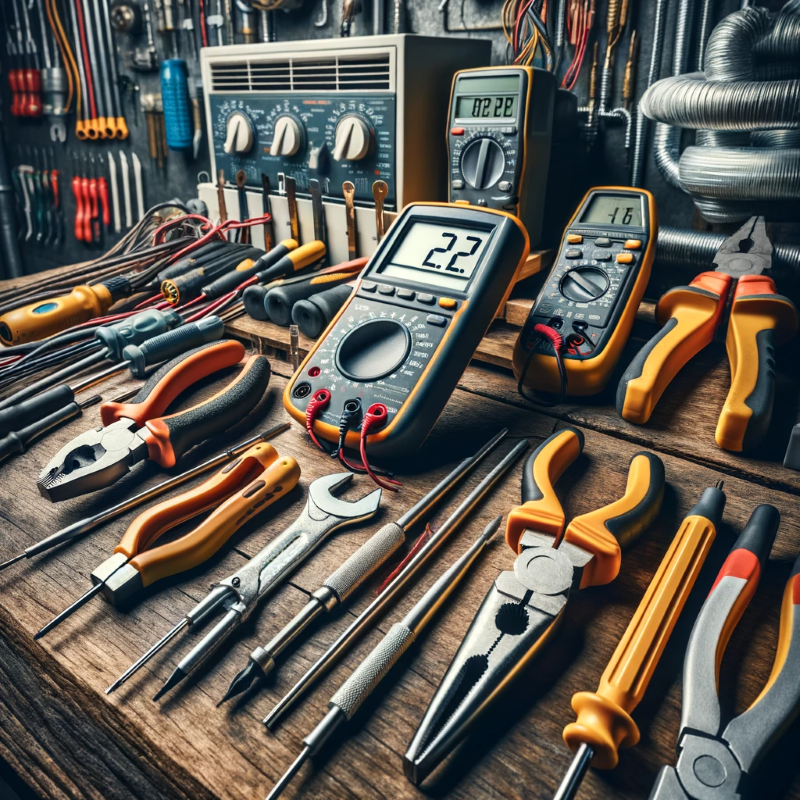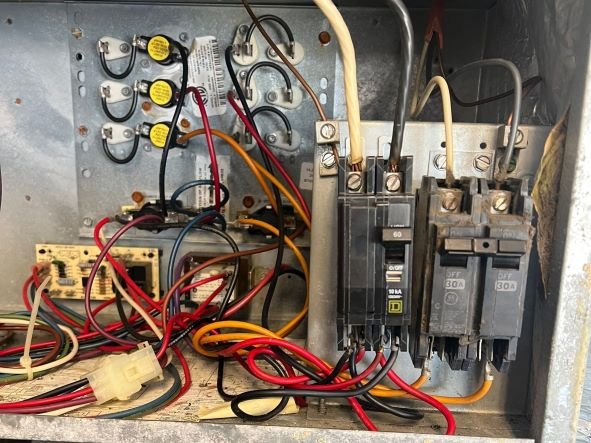Cost for HVAC Minor Electrical Repair: A Comprehensive Guide
How much does it cost for a minor HVAC electrical repair?
$200 for a minor repair.
We’ve mentioned in a previous article that most HVAC companies have an unadvertised minimum cost of $200 plus whatever material is used. What each HVAC company considers minor varies. But typically it’s based on the amount of disassembly and reassembly that’s required. Some of the repairs mentioned below would not be considered “minor”.
Introduction
In the realm of modern living, HVAC (Heating, Ventilation, and Air Conditioning) systems are the unsung heroes that keep our homes comfortable year-round. Whether it's the scorching heat of summer or the chilling winds of winter, these intricate systems work tirelessly to maintain the ideal indoor climate. Yet, like any complex machinery, HVAC systems are not immune to issues, and one common set of problems homeowners often encounter are minor electrical repairs.
Understanding the cost of HVAC minor electrical repairs is essential for every homeowner. These seemingly small electrical issues, if left unattended, can escalate into major problems that not only compromise your comfort but also result in significant financial setbacks. This comprehensive guide will shed light on the various aspects of HVAC minor electrical repairs, from the common issues you might encounter to the factors influencing repair costs, and from the advantages and disadvantages of DIY solutions to the importance of hiring a professional HVAC technician.
By the time you've finished reading this article, you'll be well-equipped to navigate the world of HVAC minor electrical repairs confidently, ensuring your system runs smoothly and your home remains a haven of comfort. So, let's dive in and explore the cost for HVAC minor electrical repair – an essential topic for any homeowner or HVAC enthusiast.
Understanding HVAC Minor Electrical Repairs
Definition and Examples of Minor Electrical Repairs
Before delving into the costs associated with residential electrical services, it's crucial to understand what these repairs entail. Minor electrical repairs in HVAC systems refer to fixing issues related to electrical components that are relatively small in scale compared to major system overhauls. These repairs aim to address specific malfunctions and ensure the electrical aspects of your HVAC system function correctly.
Examples of minor electrical repairs include:
Capacitor Replacement: Capacitors store electrical energy and are vital for starting the compressor and fan motors. When capacitors fail, your HVAC system may struggle to start, resulting in poor performance or complete system breakdown.
Thermostat Replacement: A malfunctioning thermostat can lead to temperature inaccuracies and inefficient heating or cooling. Replacing a faulty thermostat is a common minor repair that can significantly improve system performance.
Wiring Repairs: Damaged or frayed wires can disrupt the flow of electricity within your HVAC system, causing issues like intermittent operation, reduced efficiency, or even safety hazards.
Transformer Replacement: Transformers are responsible for voltage conversion within the system. If a transformer fails, it can affect various components, requiring replacement to restore normal operation.
Circuit Board Replacement: The circuit board (or control board) is the "brain" of your HVAC system, responsible for coordinating its functions. When a circuit board malfunctions, it can lead to erratic behavior or system failure.
Electrical Component Testing and Diagnosis: Sometimes, minor electrical repairs involve thorough testing and diagnosis of electrical components to identify and address underlying issues, even if no physical replacement is needed.
Miscellaneous Electrical Repairs: This category covers various other minor electrical repairs, such as fixing loose connections, addressing short circuits, or resolving issues with relays and switches.
Common Electrical Issues in HVAC Systems
To better understand the cost implications, it's essential to be aware of the common electrical issues that HVAC systems encounter. These issues can serve as warning signs that minor electrical repairs may be necessary:
Frequent Tripping of Circuit Breakers: If your HVAC system repeatedly causes circuit breakers to trip, it may indicate an electrical problem that needs attention.
Inconsistent Heating or Cooling: Uneven temperatures or the inability to maintain the desired comfort levels can be due to electrical issues affecting components like thermostats, capacitors, or sensors.
Unusual Sounds or Odors: Strange noises or unusual odors coming from your HVAC system could signal electrical problems, especially if they coincide with operational issues.
Increased Energy Bills: A sudden and unexplained increase in your energy bills may result from electrical inefficiencies in your HVAC system, causing it to work harder and consume more energy.
By understanding these common issues and recognizing their symptoms, homeowners can take proactive steps to address minor electrical repairs promptly, potentially saving both money and discomfort in the long run. In the next section, we will explore the factors that influence the costs associated with these repairs.
There are a variety of electrical repairs that are for professional electricians, such as smoke detectors, carbon monoxide detectors, and flickering lights.
Factors Affecting HVAC Minor Electrical Repair Costs
The cost of HVAC minor electrical repairs can vary widely depending on several factors. It's essential to consider these variables when assessing the potential expense of addressing electrical issues within your HVAC system. Understanding these factors will help you make informed decisions about how to manage and budget for these repairs effectively.
Severity of the Electrical Issue
The extent of the electrical problem in your HVAC system plays a significant role in determining the repair cost. Minor issues like a simple wire repair or capacitor replacement will generally be less expensive compared to more complex problems, such as a malfunctioning circuit board or a complete system overhaul. The severity of the issue often dictates the time and expertise required for the repair, impacting the overall cost.
Type of HVAC System
The type of HVAC system you have can influence repair costs. Common HVAC systems include central air systems, split systems, ductless systems, and more. Each system has its unique components and complexities. Repairing certain electrical components in one system may be more straightforward and affordable than in another. It's essential to consider your HVAC system's design when estimating repair expenses.
Age and Condition of the HVAC Unit
The age and overall condition of your HVAC unit can significantly affect repair costs. Older systems may require more frequent repairs due to wear and tear on electrical components. Additionally, finding replacement parts for older systems can sometimes be more challenging and costly. Well-maintained, newer systems are generally less prone to electrical issues, reducing the likelihood of major repairs.
Location and Accessibility of the Electrical Components
The location and accessibility of the electrical components needing repair can impact the cost. If the components are easily accessible and don't require extensive dismantling or labor, the repair may be more affordable. However, if the electrical components are located in hard-to-reach areas or require disassembly of the HVAC system, labor costs may increase.
Labor and Material Costs in Your Area
The cost of labor and materials can vary significantly depending on your geographical location. HVAC repair costs tend to be higher in metropolitan areas with a higher cost of living. It's advisable to obtain multiple quotes from local HVAC contractors to compare prices and ensure you're getting a fair estimate for the repair.
Emergency vs. Scheduled Repairs
Emergency HVAC electrical repairs, which are often required when the system fails unexpectedly, may incur higher costs compared to scheduled or routine maintenance. Planning ahead and scheduling regular maintenance can help identify and address minor electrical issues before they become emergencies, potentially saving on repair expenses.
Understanding these factors will allow you to assess the potential cost of HVAC minor electrical repairs more accurately. In the next section, we will break down the typical costs associated with common HVAC electrical repairs to provide a clearer picture of what you can expect.
Cost Breakdown: Typical HVAC Minor Electrical Repairs
To gain a better understanding of the costs associated with HVAC minor electrical repairs, it's essential to explore the specific repair scenarios and their associated expenses. Below, we break down the typical costs for common HVAC minor electrical repairs:
Capacitor Replacement
Cost Range: $80 - $250
Capacitors are essential components in HVAC systems, responsible for starting the air conditioning compressor and fan motors. Replacing a faulty capacitor is one of the more common and affordable electrical repairs. The cost can vary based on the type and size of the capacitor needed for your system.
Thermostat Replacement
Cost Range: $80 - $300
A malfunctioning thermostat can lead to temperature inconsistencies and inefficient heating or cooling. Replacing a thermostat typically falls within a moderate cost range. Prices can vary based on the thermostat's features and complexity.
Wiring Repairs
Cost Range: $100 - $400
Addressing damaged or frayed wires within your HVAC system is crucial for safe and efficient operation. The cost of wiring repairs depends on the extent of the damage and the complexity of the wiring within your system.
Transformer Replacement
Cost Range: $100 - $350
Transformers are responsible for voltage conversion within the HVAC system. Replacing a transformer is relatively affordable, but costs can vary based on the specific transformer required for your system.
Circuit Board Replacement
Cost Range: $150 - $600
The circuit board, or control board, serves as the central control unit for your HVAC system. Replacing a malfunctioning circuit board on an air conditioner can be one of the more costly electrical repairs due to its complexity and the need for precise calibration.
Electrical Component Testing and Diagnosis
Cost Range: $80 - $200
In cases where the issue isn't immediately apparent, HVAC technicians may charge for the time spent testing and diagnosing electrical components. This cost is typically lower than that of component replacement.
Miscellaneous Electrical Repairs
Cost Range: Varies widely
Miscellaneous electrical repairs encompass a range of minor issues, from fixing loose connections to addressing short circuits. The cost for these repairs can vary widely depending on the specific problem and the time required for resolution.
It's important to note that these cost ranges are approximate and can vary depending on factors such as your location, the HVAC contractor you choose, and the brand of components used for replacements. When facing an HVAC minor electrical issue, it's advisable to obtain multiple quotes from reputable HVAC professionals to ensure you receive a fair and competitive price for the necessary repairs.
In the following sections, we will delve deeper into considerations such as DIY repairs versus professional services, obtaining multiple quotes, and cost-saving strategies for HVAC electrical repairs.
DIY vs. Professional HVAC Electrical Repairs
Benefits and Drawbacks of DIY Repairs
DIY HVAC electrical repairs can be tempting for homeowners looking to save money. While there are some minor electrical issues that experienced DIYers can tackle, it's essential to weigh the benefits and drawbacks carefully:
Benefits:
Potential cost savings on labor charges.
Immediate action when you have the necessary skills and tools.
Satisfaction and empowerment from completing the repair yourself.
Drawbacks:
Safety risks: Working with electrical components can be hazardous without proper training and equipment.
Warranty concerns: DIY repairs may void warranties on HVAC equipment.
Risk of exacerbating the issue: Inexperienced repairs can lead to more significant problems.
Lack of expertise: Complex electrical issues may require professional diagnosis and repair.
Safety Concerns and Potential Risks
Safety should be a top priority when considering DIY HVAC electrical repairs. The electrical components within your HVAC system can carry high voltage, posing significant risks if mishandled. To mitigate safety concerns:
Always turn off the power supply before attempting any electrical work.
Use appropriate safety gear, such as gloves and safety glasses.
Educate yourself thoroughly about the repair task and follow safety guidelines.
When in doubt, consult a professional HVAC technician to assess the issue and provide guidance.
Importance of Hiring a Licensed HVAC Technician
For most homeowners, hiring a licensed HVAC technician is the safest and most reliable choice when dealing with HVAC electrical repairs. Here's why:
Expertise: HVAC technicians have specialized training and experience in diagnosing and repairing HVAC electrical issues.
Safety: They have the necessary safety equipment and knowledge to work with electricity safely.
Warranty protection: Professional repairs typically maintain manufacturer warranties.
Troubleshooting: HVAC technicians can identify underlying problems and prevent future issues.
Compliance: They ensure repairs comply with local building codes and regulations.
While DIY repairs may be suitable for minor tasks like changing air filters or cleaning coils, it's advisable to leave electrical repairs to the experts to ensure your HVAC system functions safely and efficiently.
Obtaining Multiple Quotes
The Importance of Getting Multiple Estimates
When faced with HVAC minor electrical repairs, it's wise to seek multiple quotes from reputable HVAC contractors. Obtaining multiple estimates offers several advantages:
Price comparison: You can assess the fairness of each estimate and avoid overpaying.
Scope of work: Different contractors may propose different solutions or approaches.
Professional insight: Contractors can explain their recommendations and address your concerns.
Contractor reputation: Research each contractor's reputation, reviews, and credentials before making a decision.
Questions to Ask Potential HVAC Repair Contractors
When obtaining estimates, be prepared to ask relevant questions to make an informed choice:
Are you licensed, insured, and bonded?
Can you provide references or customer reviews?
What is the estimated cost of the repair, including parts and labor?
What is the timeline for completing the repair?
Do you offer any warranties or guarantees for your work?
Are there any potential additional costs or contingencies?
Will you provide a written estimate and contract?
Comparing answers to these questions will help you select a trustworthy HVAC contractor for your minor electrical repairs.
Cost-Saving Tips and Strategies
Maintenance and Prevention Measures
To minimize the need for HVAC electrical repairs and their associated costs, consider these maintenance and prevention strategies:
Schedule regular professional HVAC maintenance to catch and address issues early.
Change air filters regularly to ensure proper airflow and reduce strain on electrical components.
Keep the area around your HVAC unit clean and free of debris.
Invest in a programmable thermostat to optimize energy efficiency.
Negotiating Repair Costs
When discussing repair costs with HVAC contractors, remember that some flexibility may exist. Here are some negotiation strategies:
Mention competitive quotes from other contractors.
Ask if there are any available discounts or promotions.
Inquire about financing options or payment plans to ease the financial burden.
Exploring Financing Options
If the repair costs are a concern, explore financing options that some HVAC companies offer. Financing can help you spread the expense over a more extended period, making it more manageable.
Conclusion
In conclusion, understanding the cost of HVAC minor electrical repairs is vital for homeowners. These repairs, while seemingly small, can have a significant impact on your HVAC system's performance, energy efficiency, and overall comfort. Whether you choose to address these issues yourself or hire a licensed HVAC technician, prioritizing safety and efficiency is paramount.
By exploring the factors influencing repair costs, comparing quotes from reputable contractors, and implementing cost-saving strategies, you can effectively manage HVAC electrical repairs and ensure your system operates optimally.
Remember that timely and well-informed decisions regarding HVAC minor electrical repairs can lead to a more comfortable, efficient, and cost-effective home environment.
Additional Resources
For further information and assistance with HVAC maintenance and repair, consider these additional resources:
Links to related articles on HVAC system maintenance and troubleshooting.
Contact information for reputable HVAC repair companies in your area.
Recommendations for tools and equipment for DIY enthusiasts looking to tackle minor HVAC repairs safely and effectively.





